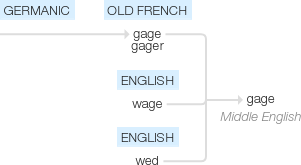Gage
Middle English: from Old French gage (noun), gager (verb), of Germanic origin; related to wage and wed.
wiktionary
From Middle English gage, from later Old French or early Middle French gager(verb), (also guagier in Old French) gage(noun), ultimately from Frankish *waddi, from Proto-Germanic *wadją (whence English wed). Doublet of wage, from the same origin through the Old Northern French variant wage. See also mortgage.
See gauge.
Back-formation from greengage.
gage
etymonline
gage (n.)
"a pledge, a pawn, something valuable deposited to insure performance," especially "something thrown down as a token of challenge," c. 1300, from Old French gage "pledge (of battle), security, guarantee; pay, reward" (11c.), from Frankish *wadja-, from Proto-Germanic *wadi- (see wed). Italian gaggio, Spanish and Portuguese gage are French loan-words.
gage (v.)
c. 1400, "to deposit as security," from Old French gager, gagier "to guarantee, promise, pledge, swear; bet, wager; pay," from gage "security, pledge" (see gage (n.)). Related: Gaged; gaging. For the measuring sense, see gauge (v.).
